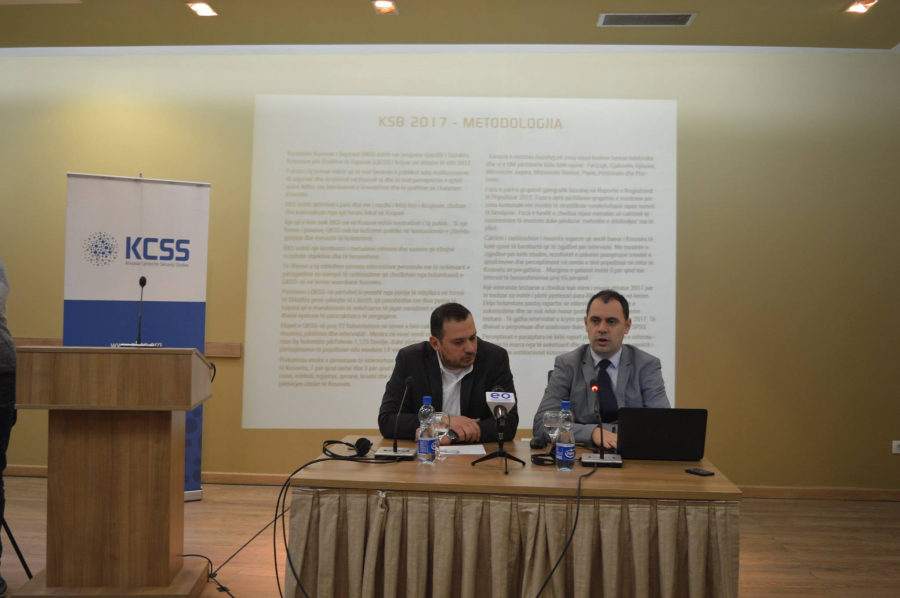1/02/2018

Kosovar Centre for Security Studies (KCSS) today, 1st of February 2018 has published today the seventh edition of Kosovo Security Barometer (KSB). This edition contains an overview of the perceptions gathered through the latest Kosovo Security Barometer survey conducted in the beginning of October 2017. As it has become a tradition over the past years, the aim of the Regular KSB Edition is to reflect the outcomes of the perceptions of citizens in two areas: regarding their trust towards the Security and Justice institutions; as well as the threats and the main risks they face.
As far as trust is concerned, similar to the previous editions, this year’s results show that the citizens trust the security institutions far more than the judiciary or other measured institutions. Moreover, compared to the previous year, the citizen positive perception has increased significantly especially towards the Kosovo Security Force (from 67% in 2016 to 78% this year). Also, there was a rise towards the Kosovo Police (from 56% in 2016 to 61% this year). Still, the results reflect a high trust in KFOR.
On the other hand, this year the level of citizen's trust of judiciary also continues to remain very low, where only about a quarter of citizens stated that they trusted either courts or prosecution. Likewise, despite the fact that the Assembly and the Government had just started their work in a new format as a result of June's democratic elections, it turns out that there has been no enthusiasm for citizens to these two institutions. Thus, similar to the previous edition, these two institutions proved to be the least trusted ones, compared to all other institutions measure. Only one in six respondents trusted them. In the meantime, the trust of citizens remains very low also regarding the EULEX (with only about one in every four respondents).
It is worth noting that this year KSB offers a new component since in addition to general results regarding trust, this report also contains in-depth results extracted from the cross-tabulation of data according to the sample composition of the respondents. Consequently, according to these sub-results, the respondents from rural areas seem to have a little more trust in security and justice institutions than those from urban areas, even though the latter may have more regular contacts with these two kinds of institutions. Also, respondents from the southern Mitrovica region showed greater trust in security and justice institutions compared to the four Serbdominated northern municipalities that have expressed a very low level of trust. Meanwhile, the same tendency was observed when analysing data from an ethnic point of view. The results showed that Kosovo Serb community in general continues to have less confidence in all security and justice institutions in Kosovo, although this difference was more noticeable in the 4 municipalities in northern Kosovo.
Significant findings also emerged when the trust results were measured from a gender perspective. Respectively, the results showed that women have more trust in security and justice institutions than men do. This was particularly evident to the rule of law institutions (police, prosecution, and courts), which can be interpreted in two ways: greater loyalty to state institutions, or greater dependence. Men, on the other hand, displayed a higher level of trust in the KSF, while they were more sceptic of institutions than women.
Meanwhile, as far as age is concerned, the findings reflected the difference in perceptions among generations, where respondents over 35 years old trust the justice and security institutions more than younger generations. Interesting findings also resulted from citizens responses about threats and risks. In the open-ended question regarding Kosovo’s main threats, the most frequent responses were the socio-economic situation, political tensions, tensions between Kosovo and Serbia, ordinal crime, violent extremism and natural disasters.
Respondents were also asked about each threat separately. The results showed that about 90% of respondents consider corruption, organized crime and unemployment as highly serious threats. About 3/4 of the respondents consider that de-stabilization in the northern part, political confrontations and violent extremism also pose a serious threat. The least perceived threat was the risks of natural disasters. Results from a more detailed analysis of the results of almost all threats and analysed risks showed that: respondents in urban areas were more concerned than those in rural areas; respondents from the North Mitrovica region appear to be less concerned about the risks and threats facing Kosovo compared with respondents from other municipalities in Kosovo; Kosovo Serbs feel less threatened by all national security threats compared to Kosovo Albanians; women and respondents older than 35 felt more concerned about the dangers and threats measured compared to male or younger respondents.
In conclusion, in this edition, the KSB has also measured public safety also called "Security Perimeter", whereby most respondents stated that they feel safer at home or in closed neighbourhoods compared to the village / city or Kosovo in generally, reflecting citizen’s uncertainty regarding long-term security rather than raising any major concerns about their personal safety.
The report can be found here